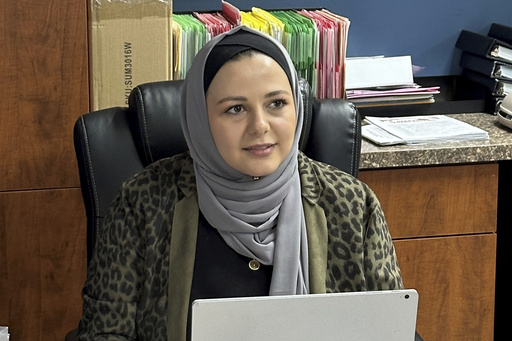
DEARBORN, Mich. — Nizam Abazid is filled with excitement as he prepares for his first journey back to Syria in many years, a place where he spent his formative years. Similarly, Rama Alhoussaini, who was just a child when her family left Syria for the United States, is looking forward to introducing her three children to relatives they’ve never had the chance to meet before.
These individuals are just part of a larger community of Syrian Americans in the Detroit area who are jubilant over the recent removal of the Syrian government. The regime, which maintained a harsh grip over the populace for over 50 years under the rule of former President Bashar Assad and his predecessor, his father, has been toppled.
“It feels so surreal to say that the Assad regime is no longer in power,” shared Alhoussaini, 31, with tears in her eyes at a Detroit-area school and daycare facility run by her family. “I never thought I would witness this day.”
However, returning to Syria may be a while in the future for many. Despite the joy surrounding Assad’s departure, several Western nations are hesitant to establish a concrete strategy for Syria, particularly concerning the safety of individuals who fled the ongoing civil war.
Ahmad al-Sharaa, who spearheaded the successful insurrection that led to Assad’s ousting in a rapid campaign that lasted under two weeks, has distanced himself from past associations with al-Qaida. He presents himself as a supporter of diversity and tolerance. Yet, the U.S. continues to categorize him as a terrorist, cautioning against travel to Syria, where the American government has not maintained an embassy since 2012, the year right after the conflict began.
For Syrian Americans who have long been unable to travel back, the downfall of the Assad administration has sparked a renewed sense of hope for a return, whether temporarily or permanently. “The end of the regime represents hope for all Syrian people,” Abazid expressed following reports of Assad’s exile to Russia.
Although Abazid possesses dual citizenship, allowing him the ability to travel to Syria anytime he chooses, he plans to delay his visit for a few months until conditions stabilize. While European leaders have deemed it premature for war-displaced refugees to return to Syria, Abazid remains undeterred.
“When Assad’s forces ruled, my fate was likely jail or worse,” Abazid recounted. “But now, I am no longer worried.”
Many Syrians who have relocated to the United States have made their homes predominantly in the Detroit area. Michigan boasts the highest concentration of Arab Americans in the nation, with Dearborn being the largest city where Arabic speakers gather. This state is also home to over 310,000 residents of Middle Eastern or North African origin.
As rebel factions gained traction in Syria, managing a swift takeover that few believed possible just weeks prior, Syrians in Detroit mirrored the global sentiment of disbelief as reports revealed city after city succumbing to Assad’s forces. Upon the announcement of the government’s collapse, jubilant celebrations erupted.
Abazid, who runs a cellphone business in Dearborn and was born in Daraa—about 60 miles from Damascus—emigrated to the United States at the age of 18 in 1984. Although he has visited Syria on a few occasions, the last time was in 1998, primarily due to what he described as harassment by the Syrian intelligence. During a particular trip in 1990, he faced severe detainment due to being taken into custody by Syrian officials.
“When I was taken from the airport, my family was completely unaware… of what was happening,” he recounted. “I still remain in the dark regarding the reason for my detainment.”
At 59, Abazid reflects on how his parents have passed away since his last journey to Syria. However, he maintains connections to his five sisters who continue to live there. His brothers all left Syria during periods between the 1970s and 1980s, including one who has not returned in over five decades since Bashar Assad’s father, Hafez al-Assad, came to power.
Alhoussaini’s beginnings trace back to Damascus, but her family moved to the Detroit area when she was young, “simply because there was nothing for us left in Syria.” She recounted tales of hardship under Assad’s regime, highlighting how her grandfather’s land was confiscated, and he was imprisoned for nearly a month.
Her father’s experience was no different, having also been detained prior to their emigration. “There never needed to be a reason,” she stated. Her father did manage to return briefly in 2010 but has not set foot back in his homeland since due to their outspoken stance against Assad following the 2011 revolution.
With Bashar Assad no longer in the picture, Alhoussaini remarked, “We don’t have to fear visiting our homeland anymore.” Her father, now 61, is contemplating a trip to Syria to reconnect with family and visit the graves of his parents. Alhoussaini aspires to take her children to meet their relatives and friends in Syria.
Her three sisters, aged 40, 34, and 29, were also born in Syria but have never returned. Now, a sense of hope pervades as they realize that people in Syria are finally able to celebrate openly. Alhoussaini believes that individuals born and raised in the U.S. may not entirely understand this transformation, considering they enjoy freedoms of expression that have remained elusive for Syrians.
“In America, you can express yourself freely,” she explained. “You can join protests without the fear of punishment or death.”
